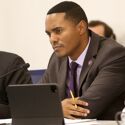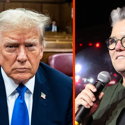
Simon Tseko Nkoli may very well be the father of South Africa’s gay rights movement.
Born in Soweto on November 26, 1957, Nkoli felt the pain of racial apartheid early. In an effort to bypass the National Party’s pass laws, which dictated where blacks could and could not go, Nkoli famously locked his parents in a closet. That seminal event not only fueled his anti-apartheid politics, but his desire to live as an openly gay man.
Nkoli came into his gay self fairly early on. Though the government explicitly prohibited homosexuality, Nkoli’s conception of the sexual divisions eschewed traditional definition. Growing up in Soweto – and then Sebokong – Nkoli learned to call homosexuality “sitabane,” which translates to hermaphrodite. His sexuality had more to do with gender than actual acts. Perhaps it’s the linguistic dissociation which helped him embrace his difference so readily.
The would-be activist found his boyfriend in 1974, when he was just seventeen. Longing for companionship, he wrote to a white man he found in a gay magazine. The two men apparently hit it off and started a clandestine relationship. It didn’t stay that way for long.
When the couple’s parents found out, they forbade the men from seeing one another. Determined to be together, Nkoli and his white lover formed a suicide pact, which Nkoli’s parents also discovered.
Fearing for their son’s life, they begrudgingly allowed him to move to Johannesburg to be with his lover. Even while living together, however, the men had to remain undercover. Rather than going to jail for violating pass laws, Nkoli pretended to be a servant.
In a protest against the pass laws, thousands of blacks staged a protest in Soweto, the township in which Nkoli spent his first years. Unprepared for such a large turnout, the state police opened fire on the crowd, killing two school children. The nation soon found itself engulfed by riots, during which hundreds, including Nkoli, were arrested.
Rather than stand down, however, Nkoli only became more determined to fight for his rights. He soon joined the Congress of South African Students. It wasn’t long until his homosexuality became public knowledge. After much debate, Nkoli’s peers decided to keep him aboard. Emboldened by his relative acceptance, Nkoli began to become more involved in gay rights and joined the Gay Association of South Africa in 1983. The primarily white group stayed out of the apartheid struggle, forcing Nkoli to find solace elsewhere. Thus, in 1984, Nkoli founded the Saturday Group, the nation’s first gay black activist group.
Nkoli never forgot his apartheid activism, of course, and joined up with the United Democratic Front, which sympathized with the banned African National Congress. The young rabble-rousers activities later landed him in jail, where he and 21 allies languished for week. It wasn’t long until Nkoli’s sexuality became public knowledge, which many of the movement’s leaders – including Popo Molege and Patrick “Terror” Lekota – to open their arms to the gay movement. The men wouldn’t be released until 1988, by which point Nkoli had found out he had HIV.
It soon became evident that apartheid wouldn’t last long. The government had overextended itself and the resistance proved too strong. As the repression crumbled, Nkoli founded another gay rights organization, Gay and Lesbian Organization of Witwatersrand. He and his allies went on to stage the nation’s first gay pride marches.
While Nkoli coalesced his team, Nelson Mandela and other ANC leaders were negotiating with the National Party. Already active in the ANC, Nkoli worked with Mandela and company to stake a gay claim in the post-apartheid world. In fact, Nkoli’s credited with pushing for a gay-inclusive constitution. Gay and black rights weren’t Nkoli’s only platforms, of course. Already well aware of his HIV status, Nkoli came out publicly and urged his countrymen to do the same. Following the new government’s formation, Nkoli founded South Africa’s first AIDS advocacy groups, Township AIDS Project and the Gay Men’s Health Forum.
Nkoli remained an active gay and AIDS activist until his death on November 30, 1998 – four days after his 41st birthday. Upon hearing word of his death, Lekota, who’s now South Africa’s minister of defense, highlighted Nkoli’s contribution to the new constitution:
How could we say that men and women like Simon who had put their shoulders to the wheel to end apartheid, how could we say that they should now be discriminated against?
It’s Nkoli’s activism that made South Africa the most inclusive nation in the world. And it’s his spirit and determination that should encourage gays the world over to push for their own rights.

















